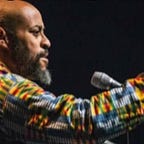Florida and the Demand of 2022
by Kokayi Nosakhere, anti-racism instructor living in Oregon
In January 2022, race is such an emotionally charged subject among my white friends and family that Florida Governor Ron DeSantis is making news supporting a state-sponsored bill PROTECTING white-bodied persons from feeling any psychological discomfort directly related to being received/perceived by Black, Indigenous Persons of Color as "white."
Written by Florida state Senator, Manny Diaz, the bill numbered, SB 148, is titled, The Individual Freedom Bill.
The specific language of the bill is: "No individual is inherently racist, sexist or oppressive, whether consciously or unconsciously, solely by the virtue of his or her race or sex."
By itself, SB 148 is not strong enough to still be generating editorials reacting to its existence a week later. The national conversation is full of enough controversy to not need Florida's help. What is creating this reaction lies within the collective of 204 million white American bodies.
Since last summer (2021,) seven states - including Florida - have passed legislation against CRT, or critical race theory. This legislation, some seven months later, has not received a persistent, organized response from those in white America who disagree.
What does that mean? In seven months, the news media has not reported on any local or national "March for True American History," or a surge in homeschool efforts by white parents. Where are the protests before school boards demanding high school history teachers get the support and respect they need?
When I ask my white friends and family why SB 148 is receiving such a muted collective reaction, the answer is: emotional exhaustion.
"Race" is charged in a way white activists have a difficult time articulating. Unlike other political issues, "race" cannot be individualized. Meaning, white women and Black women can find common ground fighting anti-abortion bills. The same cannot be said about anti-CRT bills. "Race" automatically gives the "white woman" something they possess little lived experience with: racial consciousness in relationship to Self.
Until the success of Trump's presidential campaign, the majority of America's 204 million citizens did not have to grapple personally with "race," unless it came up temporarily in an interpersonal exchange or was purposely brought into the room by a diversity training team. "Race" was something externalized. It existed in the past or was in the possession of a small group of white people that were clearly "willfully ignorant." Trump's personality forced "race" to cease being a "character flaw."
Ironically, it wasn't Trump, himself, who drove this wedge. It was the self-reveal of those white-bodied persons who are living as if racial moments did not affect them. Their "white racial innocence" was the problem, just as much as Trump's overtly racist national policies. For the first time in their lives, "race" was something they, themselves, possessed - and they did not know what to do about it.
I am taught that if I can see the problem, that means, I am a vehicle for the solution. The problem I see is plain. "Whiteness" means something evil in the subconscious of my white friends and family. They want nothing to do with it. Being seen as "white" lands as being "dehumanized." The white bodied person feels stripped of what they do have control over - how they show up as a friend, lover, co-worker - and forced to carry the burden of policing the evil in other white-bodies.
They argue against being treated by Black, Indigenous Persons of Color as if their individual personality needs to be protected from the discomfort of being seen as "white," like Governor Ron DeSantis is advocating. In 2022, the individual white person is losing in the court of public opinion. Every argument proclaiming innocence is used as evidence of participating in a few-centuries-old-delusion.
To help, I wrote a book entitled, "Leaving White City: Raising Racial Awareness in Oregon."
The following is a part of the introduction of the book and serves the purpose of being an introduction here:
I am an activist. I want you to act. I don't want you to learn clever arguments explaining the problem and regurgitate those same arguments to those who never heard them. Education is only one component of the solution. Once you know, please act like you know.
What does that mean? That means, this communication is a workbook of sorts. Each chapter covers a specific concept. The concept is communicated three times: through story, philosophy and introspection exercises.
In chapter one - for those in white bodies - please prepare yourself to explore how and when you woke up to the fact you were experienced by BIPoC as a white person and not the "universal concept" of human.
In chapter two, explore how "white racial innocence" is maintained through assimilation practices by BIPoC.
In chapter three, learn how prevalent "white space" is and learn why those meant to produce "diversity" struggle to be themselves while surrounded by "oppressors."
The fourth chapter explores the collective shadow of "whiteness," as expressed on the national stage.
The fifth chapter brings the national shadow to the local. A rural community in Southern Oregon is given the spotlight.
Ideally, white-bodied college students will benefit from the ideas collected here, however, it serves any white-bodied person choosing to rise out of the trauma of colonialism and walk towards the next horizon of our collective humanity.
To purchase this book, please email me at royalstar907@gmail.com. This title is a part of my anti-racism bundle on Teachable, which includes (now) five titles and a live speech addressing intergenerational trauma.
